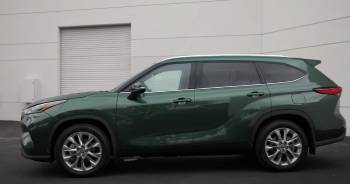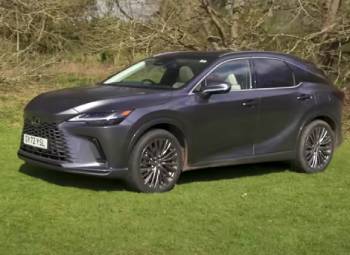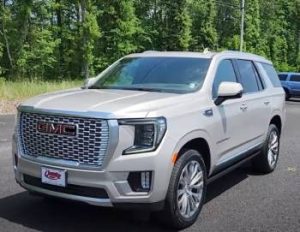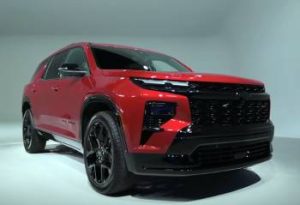When it comes to luxury SUVs, the choices can be quite overwhelming. Two prominent names that come to mind are the Highlander and the Lexus RX.
But which one stands out? Let’s dive into the details.
A Brief Comparison Table
| Feature/Aspect | Toyota Highlander | Lexus RX |
| Origin & Branding | Toyota’s main line | Lexus (Toyota’s luxury division) |
| Price | More affordable | Premium pricing |
| Interior | Comfortable, functional | Plush, luxurious |
| Seating Capacity | Up to 8 passengers | Typically 5, with some 7-seater options |
| Performance | Steady, family-oriented | Powerful, sportier |
| Safety & Tech | Standard with some optional advanced tech | Comprehensive, advanced features standard |
| Fuel Efficiency | Better | Slightly lower |
| Resale Value | Good, but not as high as luxury brands | Higher, due to luxury branding |
Highlander: Pros and Cons

Pros:
- Value for Money:
The Highlander, being a part of the Toyota lineup, offers an impressive range of features without breaking the bank. The overall cost of ownership tends to be lower than luxury brands.
- Reliability:
Toyota has a long-standing reputation for producing vehicles that are durable and reliable. The Highlander is no exception.
- Comfort:
With its spacious interiors, the Highlander can comfortably seat up to eight people, making it an excellent choice for large families.
- Fuel Efficiency:
Compared to other SUVs in its class, the Highlander offers commendable fuel efficiency.
Cons:
- Less Luxurious Feel:
Although the Highlander boasts a comfortable interior, it might not feel as upscale as its competitors, like the Lexus RX.
- Resale Value:
While Toyotas generally hold their value well, luxury brands often have a higher resale value.
Also Read: Differences Between Mobil 1 Truck & SUV And Extended Performance Oil.
Lexus RX: Pros and Cons

Pros:
- Luxury:
The Lexus RX is all about luxury. From its plush leather interiors to its advanced tech features, every detail screams opulence.
- Performance:
With a more robust engine and smoother transmission, the Lexus RX provides a driving experience that’s a class apart.
- Safety Features:
Being a luxury brand, the Lexus RX comes loaded with advanced safety features, some of which might be optional or unavailable in the Highlander.
- Brand Prestige:
Owning a Lexus is not just about the car; it’s about the status and prestige associated with the brand.
Cons:
- Price:
The Lexus RX comes with a heftier price tag, both in terms of initial cost and maintenance.
- Fuel Efficiency:
Luxury often comes at the cost of fuel efficiency. While the Lexus RX isn’t a gas guzzler, the Highlander has an edge in this department.
- Cost of Ownership:
Replacement parts and services for Lexus tend to be more expensive than Toyota.
Highlander and Lexus RX: A User’s Perspective
For someone who values luxury, brand status, and advanced features, the Lexus RX is a no-brainer. It embodies sophistication and offers an elevated driving experience.
But if you’re looking for a more budget-friendly, reliable, and family-oriented vehicle, the Highlander is your go-to. It strikes a balance between comfort, durability, and cost.
Also Read: Differences Between Mobil Delvac 1300 Super And Shell Rotella Oil.
Key Differences Between Highlander and Lexus RX
The Highlander and the Lexus RX are top contenders in the mid-size SUV market.
While they may seem similar at first glance, delve a little deeper and you’ll find a number of distinctions that separate them. Here’s a detailed breakdown of the key differences:
- Origin and Branding
Highlander:
The Toyota Highlander hails from the globally recognized Toyota brand. Known for its reliability, Toyota has a longstanding reputation for producing vehicles that cater to a wide range of budgets, emphasizing functionality and durability.
Lexus RX:
The Lexus RX, on the other hand, is part of Toyota’s luxury division, Lexus. With a focus on opulence, driving experience, and cutting-edge technology, Lexus caters to a more premium market segment.
- Price Point
Highlander:
Generally speaking, the Highlander comes with a more affordable price tag. This affordability extends not only to the initial purchase price but also to the subsequent costs of maintenance and parts.
Lexus RX:
Being a luxury SUV, the RX commands a higher price point. From the initial purchase to maintenance, owning a Lexus RX is undeniably more expensive.
- Interior Features and Finishing
Highlander:
The Highlander boasts a comfortable and spacious interior. With room for up to eight passengers, it’s designed for family comfort. Though its finishings are high-quality, they don’t quite match the luxury standards set by premium brands.
Lexus RX:
The RX, true to its luxury branding, offers plush leather interiors, ambient lighting, and advanced tech features. The attention to detail is meticulous, ensuring an upscale feel throughout the vehicle.
- Performance
Highlander:
The Highlander offers steady performance suitable for family commutes and long drives. Its engine options are more modest, focusing on fuel efficiency and reliability.
Lexus RX:
With a more robust engine, the Lexus RX offers better acceleration and overall power. Its performance is more attuned to those seeking thrill and agility in their driving experience.
- Safety and Technology
Highlander:
While the Highlander comes equipped with essential safety features and some advanced tech, certain features might be available only in higher trims or as add-on packages.
Lexus RX:
Being in the luxury segment, the RX doesn’t hold back on advanced safety features. Most of these come standard, ensuring that drivers have the latest in safety and entertainment technology at their fingertips.
- Fuel Efficiency
Highlander:
One of the Highlander’s strengths lies in its commendable fuel efficiency. For its size and category, it fares pretty well, making it a good choice for those conscious about fuel consumption.
Lexus RX:
While the RX offers decent fuel efficiency, especially for a luxury SUV, it generally lags slightly behind the Highlander in this department.
- Resale Value
Highlander:
Toyotas, in general, hold their value well over time. However, they may not have as high a resale value as luxury brands.
Lexus RX:
Luxury vehicles like the RX tend to depreciate slower and have a higher resale value than non-luxury counterparts.
Frequently Asked Questions (FAQs):
Not exactly. While both vehicles are mid-sized SUVs, the Highlander tends to be slightly larger, especially in terms of passenger capacity. The Highlander can seat up to eight, while the Lexus RX typically seats five, with an option for seven in some configurations.
It depends on what you prioritize. If luxury, brand prestige, and advanced features are your top concerns, the Lexus RX wins hands down. However, if you’re looking for value for money, reliability, and a family-friendly vehicle, the Highlander shines.
From a luxury and performance standpoint, the Lexus RX350, with its more powerful engine and upscale amenities, might be seen as superior. But in terms of affordability, fuel efficiency, and seating capacity, the Highlander takes the cake.
The Lexus RX is often considered the luxury counterpart of the Toyota Highlander. Both are mid-sized SUVs, but the Lexus RX offers a more upscale experience.
Opting for a Lexus gives you an entry into the world of luxury cars. You’re not just paying for the vehicle, but the brand, the enhanced features, the status, and the premium service that comes with it.
Yes, Lexus is Toyota’s luxury vehicle division. While they share some technologies and components, Lexus vehicles emphasize luxury, performance, and a more premium driving experience.
Conclusion
In conclusion, the choice between the Highlander and Lexus RX boils down to personal priorities. Both vehicles have their strengths and cater to different audiences. So, evaluate what matters most to you, and let that guide your decision.
While both the Highlander and Lexus RX have their unique strengths, your choice will likely boil down to budget, preference for luxury, and the specific features you prioritize. Both vehicles have proven to be reputable and reliable in their respective segments.



